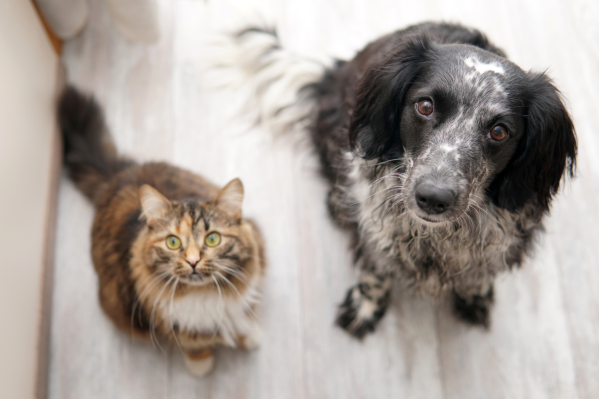Pest control can be tricky, time consuming, and even downright dangerous if you don’t approach it safely. Many common pesticides contain chemicals that can be harmful to both humans and pets. But at the same time, you can’t let a pest problem linger, because that can cause an even more unfavorable situation.
The best pet-safe pest control solution will depend on which pests are taking up residence in your home and the severity of the infestation.
Pet parents have a few options for getting rid of pests without harming their pets.
Pet-safe pest control 101
When browsing pest control solutions, you'll quickly notice that you have an abundance of options at your disposal. One factor that can help you narrow down your search is the ingredients used in the product.
Know which chemicals to avoid
It's important to know which chemicals to avoid to ensure safety for your pet.
According to pest expert Keith Budd, organophosphates and carbamates fall into the dangerous category.
"These both can cause salivation, increased urination, diarrhea, and muscle weakness in acute exposures. Neuropathy and breathing issues can begin days to weeks later, causing shortness of breath, aggressive behaviors, and even death in pets," Budd explains.
Carbamates can be found in some over the counter flea collar brands like Adam’s or Zodiac, so make sure you look at the ingredient list or run it by a vet first before you purchase any pest preventative or treatment.
Hire a pet-safe pest professional
Most pest control companies carry pet-safe options. Ask about this when shopping different providers, then double check with the technician once they arrive. They should come with information and labels detailing every pesticide they plan to use during treatment.
"These options usually trade off some efficacy or residual effects for safety," says Budd. "However, many products are considered safe once dried or when applied properly."
DIY pet-safe pest control solutions
If you're not able to find a professional that meets your standards, or if you need a temporary solution while you wait for them to arrive, there are some DIY remedies you can try at home.
For example, there are certain plants you can grow that repel some pests, such as marigolds, basil, or lavender. However, it's important to double check the safety of any plants you bring into your home, because these can also pose dangers to pets.
"There are many do it yourself options that are safe, but again, you trade that safety for effectiveness," explains Budd. "Pest control professionals go through training, testing, and licensing to learn the safest and most effective ways to apply pest management application, and target specific species and concerns. Generally, going with the professionals is the safest route."
Other pest practices
Now that you know what to look for in pet-safe pest solutions, it's also wise to start employing preventative practices so you're not reaching back out to your technician a month after treatment.
One top tip? Don't leave food out.
"We usually see pests around food sources. Pet food can be a big draw for all kinds of pest animals, from ants to rodents, or even larger mammals," says Budd. "Feeding animals on a schedule and making sure there is not food left out is not only better for pet health, but prevents pest activity."
Storing pet food and wild bird seed in airtight sealed containers prevents pests such as meal moths, ants, and rodents. Cleaning up pet waste is also very crucial to pest management, as it can be a draw for not only flies, but fleas and ticks as well.
Lastly, pesticides should only be used and stored as directed on the label. Improper use and storage is not only best practice, it is law.
"Keeping pesticides stored out of reach of pets and in the original containers can prevent accidental ingestion," says Budd. "Do not tamper with any pesticide application devices such as bait boxes or traps. These can expose your pets to anything inside, such as rodent baits and poisons."
Have questions about pet-safe pest control? Chat with a vet professional to understand what is and is not safe for your pet. Pawp experts are here to help 24/7.
